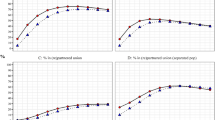Abstract
The educational expansion in Spain started in the mid-1950s triggered by a growing level of industrialization. The expansion of higher education, however, only reached the working and middle-classes some time later in the 1970s. This chapter analyses the effect of this educational expansion on the partner selection process. In particular, it focuses on the mechanisms whereby individuals make choices about future partner candidates.
Access this chapter
Tax calculation will be finalised at checkout
Purchases are for personal use only
Preview
Unable to display preview. Download preview PDF.
Similar content being viewed by others
References
Blau, P.M. (1994). Structural context of opportunities. Chicago/London: University of Chicago Press.
Blossfeld, H.-P., A. Timm and F. Dasko (1998). ‘The educational system as a marriage market. A longitudinal analysis of marriage in the life course’. Working Paper No. 46, University of Bremen, Germany, Special Research Centre 186.
Boyd-Barrett, O. (1995). ‘University reform’. In: O. Boyd-Barrett and P. O’Malley (eds). Education reform in Democratic Spain. London/New York: Routledge.
Boyd-Barrett, O. (1995). ‘Strutural change and curriculum reform in Democratic Spain’. In: O. Boyd-Barrett and P. O'Malley (eds.). Education reform in Democratic Spain. London/New York: Routledge, 6–24.
Cabrera, L. J., C. D. Dâvila and S. M. González (1999).’ La demanda de ensenanza universitaria en Espana’. Tempora: Revista de historia y sociologia de la educación, 2: 83–132.
Carabana, J. (1981). ‘Homogamia y movilidad social’. REIS, 21(83): 61–81.
Delgado, M. and T. Castro (1998). ‘Encuesta de Fecundidad y Familia 1995 (FFS)’. Opiniones y Actitudes, 20. Madrid: Centra de Investigaciones Sociales.
Eurostat (1997). Demographic statistics 1997. Luxembourg: Office for Official Publications of the European Communities.
Garrido, L. J. (1992). Las dos biografias de la mujer en Espana. Madrid: Institute de la Mujer. Ministerio de Asuntos Sociales.
Gonzalez, M.J. (2001), Spouses’ careers in Spain’. In Blossfeld, H.P. and Drobniö, S. (eds.) Careers of couples in contemporary societies. From male breadwinner to dual earner families. Oxford: Oxford University Press.
Iglesias De Ussel, J. (1995). ‘Trabajo y familia en Espana’. Revista Internacional de Sociologia, Tercera Epoca, 11: 171–198.
Institute Nacional de Estadistica (INE) (1981). Encuesta de Población Activa. Segundo trimestre de 1981. Madrid: INE.
Institute Nacional de Estadistica (INE) (1996). Encuesta de Población Activa. Segundo trimestre de 1996. Madrid: INE.
Latiesa, M. (1992). ‘La deserción universitaria. Desarrollo de la escolaridad en la ensenanza superior. Éxitos y fracasos’. Centro de Investigaciones Sociológicas, 124. Madrid: Siglo Veintiuno de España Editores.
Ministerio de Trabajo y Seguridad Social (MTSS) (1984). Anuario de Estadisticas Laborales 1982-83. Madrid: MTSS.
Miret, P. (1997). ‘Nupciality patterns in Spain in the eighties’. Genus, 3-4(LIII): 183–198.
Moltó, M. L. (1995). ‘Women and the employment rate in Spain: The causes and consequences of variations in female activity and employment patterns’. European Commission Network of Experts on the Situation of Women in the Labour Market: Final Report.
Oppenheimer, V. K. (1988). ‘A theory of marriage timing’. Americal Journal of Sociology, 94(3): 563–91.
Smits, J., W. Ultee and J. Lammers (1996). ‘Effects of occupational status differences between spouses on the wife’s labor force participation and occupational achivement: findings from 12 European countries’. Journal of Marriage and the Family, 58: 101–115.
Smits, J., W. Ultee and J. Lammers (1998). ‘Educational homogamy in 65 countries: an explanation of differences in openness using country-level explanatory variables’. American Sociological Review, 63: 264–285.
Treiman, D. J. (1970). ‘Industrialization and social stratification’. In: E. O. Laumann (ed.). Social stratification: research and theory for the 1970s. Indianapolis: Bobbs-Merrill.
Ultee, W.C. and R. Luijkx (1990). ‘Educational heterogamy and father-to-son occupational mobility in 23 industrial nations’. European Sociological Review, 6: 125–49.
Editor information
Editors and Affiliations
Rights and permissions
Copyright information
© 2003 Springer Science+Business Media Dordrecht
About this chapter
Cite this chapter
González Lopez, M.J. (2003). Who Marries whom in Spain?. In: Blossfeld, HP., Timm, A. (eds) Who Marries Whom?. European Studies of Population, vol 12. Springer, Dordrecht. https://doi.org/10.1007/978-94-007-1065-8_7
Download citation
DOI: https://doi.org/10.1007/978-94-007-1065-8_7
Publisher Name: Springer, Dordrecht
Print ISBN: 978-1-4020-1803-9
Online ISBN: 978-94-007-1065-8
eBook Packages: Springer Book Archive




